论高中生英语自主学习能力的培养英语论文
- 格式:doc
- 大小:247.50 KB
- 文档页数:53
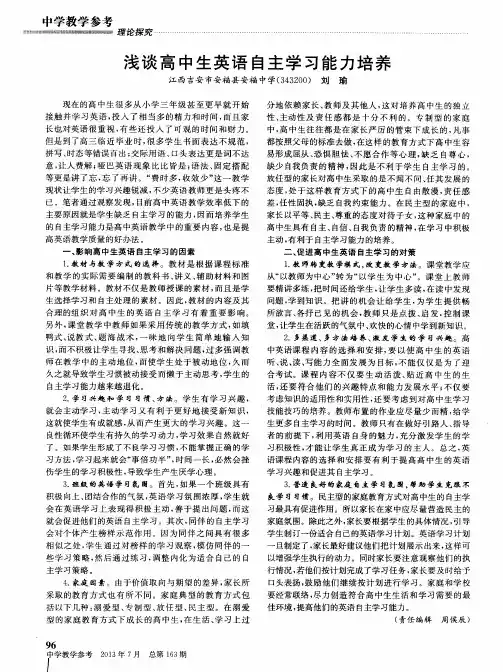
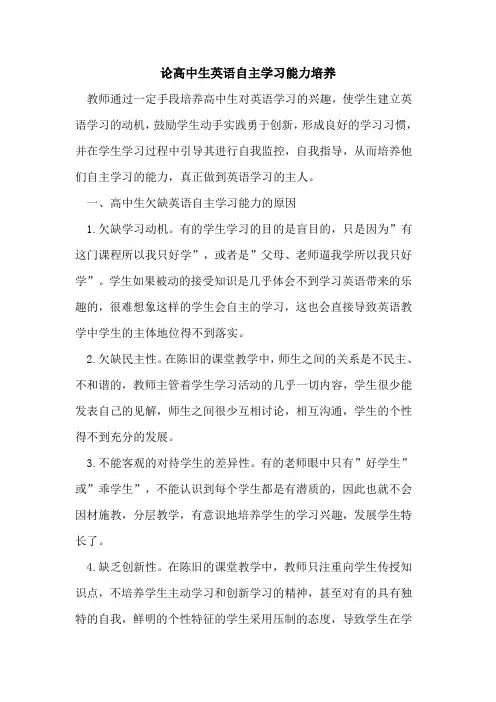
论高中生英语自主学习能力培养教师通过一定手段培养高中生对英语学习的兴趣,使学生建立英语学习的动机,鼓励学生动手实践勇于创新,形成良好的学习习惯,并在学生学习过程中引导其进行自我监控,自我指导,从而培养他们自主学习的能力,真正做到英语学习的主人。
一、高中生欠缺英语自主学习能力的原因1.欠缺学习动机。
有的学生学习的目的是盲目的,只是因为”有这门课程所以我只好学”,或者是”父母、老师逼我学所以我只好学”。
学生如果被动的接受知识是几乎体会不到学习英语带来的乐趣的,很难想象这样的学生会自主的学习,这也会直接导致英语教学中学生的主体地位得不到落实。
2.欠缺民主性。
在陈旧的课堂教学中,师生之间的关系是不民主、不和谐的,教师主管着学生学习活动的几乎一切内容,学生很少能发表自己的见解,师生之间很少互相讨论,相互沟通,学生的个性得不到充分的发展。
3.不能客观的对待学生的差异性。
有的老师眼中只有”好学生”或”乖学生”,不能认识到每个学生都是有潜质的,因此也就不会因材施教,分层教学,有意识地培养学生的学习兴趣,发展学生特长了。
4.缺乏创新性。
在陈旧的课堂教学中,教师只注重向学生传授知识点,不培养学生主动学习和创新学习的精神,甚至对有的具有独特的自我,鲜明的个性特征的学生采用压制的态度,导致学生在学习中不敢发表自己的见地,更不用谈善于发现勤于探究。
二、高中生英语自主学习的指导原则高中生英语自主学习的原则:1.学生主体性原则。
力求每个学生在英语课堂上都有机会最充分地展示自己的才能。
尊重学生的人格,相信学生都具备巨大的学习潜能,激发学生学习的热情和主动性,使学生真正成为学习的主人。
2.和谐的师生关系原则。
即在英语课堂教学中,建立起新型的、和谐平等的师生关系。
它具体体现在教师的作用既是主导,又具有辅助性;学生是主体,具有自主性,应当树立平等的师生观。
教师信任并尊重学生,理解并支持学生,启发并鼓励学生,营造一种宽松和谐的学习气氛,为学生学习英语创设培养主体意识的最佳情境。
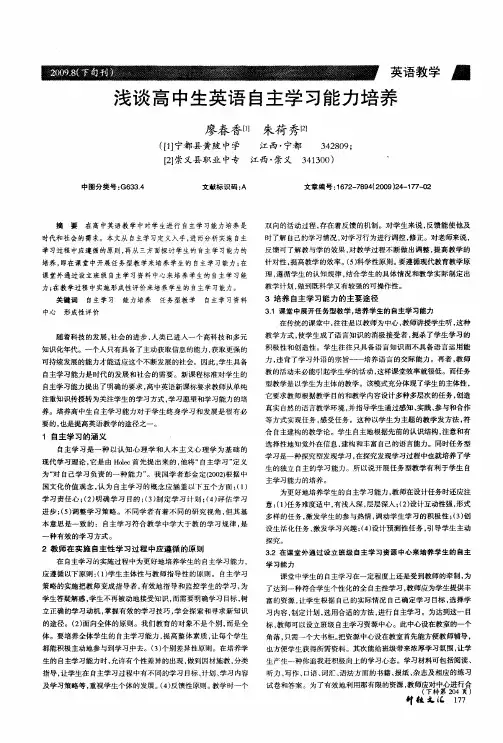
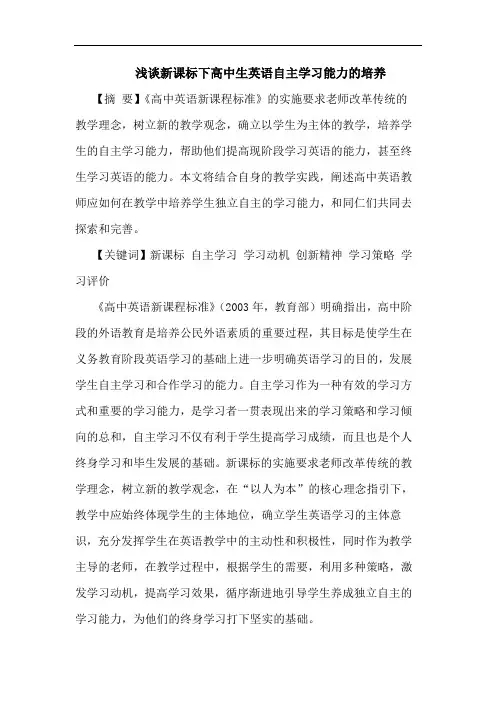
浅谈新课标下高中生英语自主学习能力的培养【摘要】《高中英语新课程标准》的实施要求老师改革传统的教学理念,树立新的教学观念,确立以学生为主体的教学,培养学生的自主学习能力,帮助他们提高现阶段学习英语的能力,甚至终生学习英语的能力。
本文将结合自身的教学实践,阐述高中英语教师应如何在教学中培养学生独立自主的学习能力,和同仁们共同去探索和完善。
【关键词】新课标自主学习学习动机创新精神学习策略学习评价《高中英语新课程标准》(2003年,教育部)明确指出,高中阶段的外语教育是培养公民外语素质的重要过程,其目标是使学生在义务教育阶段英语学习的基础上进一步明确英语学习的目的,发展学生自主学习和合作学习的能力。
自主学习作为一种有效的学习方式和重要的学习能力,是学习者一贯表现出来的学习策略和学习倾向的总和,自主学习不仅有利于学生提高学习成绩,而且也是个人终身学习和毕生发展的基础。
新课标的实施要求老师改革传统的教学理念,树立新的教学观念,在“以人为本”的核心理念指引下,教学中应始终体现学生的主体地位,确立学生英语学习的主体意识,充分发挥学生在英语教学中的主动性和积极性,同时作为教学主导的老师,在教学过程中,根据学生的需要,利用多种策略,激发学习动机,提高学习效果,循序渐进地引导学生养成独立自主的学习能力,为他们的终身学习打下坚实的基础。
我省新教材改革实施已进入首轮高考,在新教材教学过程,老师不仅要不断学习和探索新的教学理念和方法,还要注意自身的角色转变,在“传道,授业,解惑”的同时,有意识地培养学生自主能力,成为他们构建知识的引路者、指导者和帮助者,我在新课程教学过程努力尝试做到以下几点:一、激发学生学习动机,提高学生英语学习兴趣动机是一切学习的原动力,是促进学生自主学习活动的主观因素,是学生学会学习的前提。
英语是一门实践性很强的学科,无论语言知识的掌握还是语言技能的培养,都必须通过学生主动的,富有个性的学习实践才能实现。
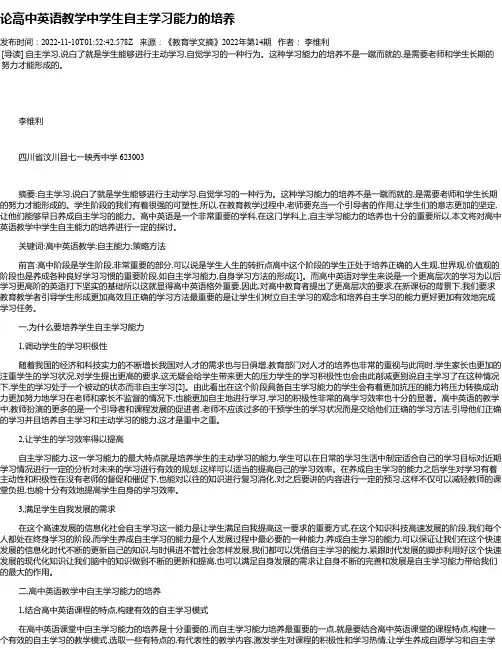
论高中英语教学中学生自主学习能力的培养发布时间:2022-11-10T01:52:42.578Z 来源:《教育学文摘》2022年第14期作者:李维利[导读] 自主学习,说白了就是学生能够进行主动学习,自觉学习的一种行为。
这种学习能力的培养不是一蹴而就的,是需要老师和学生长期的努力才能形成的。
李维利四川省汶川县七一映秀中学 623003摘要:自主学习,说白了就是学生能够进行主动学习,自觉学习的一种行为。
这种学习能力的培养不是一蹴而就的,是需要老师和学生长期的努力才能形成的。
学生阶段的我们有着很强的可塑性,所以,在教育教学过程中,老师要充当一个引导者的作用,让学生们的意志更加的坚定,让他们能够早日养成自主学习的能力。
高中英语是一个非常重要的学科,在这门学科上,自主学习能力的培养也十分的重要所以,本文将对高中英语教学中学生自主能力的培养进行一定的探讨。
关键词:高中英语教学;自主能力;策略方法前言:高中阶段是学生阶段,非常重要的部分,可以说是学生人生的转折点高中这个阶段的学生正处于培养正确的人生观,世界观,价值观的阶段也是养成各种良好学习习惯的重要阶段,如自主学习能力,自身学习方法的形成[1]。
而高中英语对学生来说是一个更高层次的学习为以后学习更高阶的英语打下坚实的基础所以这就显得高中英语格外重要,因此,对高中教育者提出了更高层次的要求,在新课标的背景下,我们要求教育教学者引导学生形成更加高效且正确的学习方法最重要的是让学生们树立自主学习的观念和培养自主学习的能力更好更加有效地完成学习任务。
一,为什么要培养学生自主学习能力1,调动学生的学习积极性随着我国的经济和科技实力的不断增长我国对人才的需求也与日俱增,教育部门对人才的培养也非常的重视与此同时,学生家长也更加的注重学生的学习状况,对学生提出更高的要求,这无疑会给学生带来更大的压力学生的学习积极性也会由此削减更别说自主学习了在这种情况下,学生的学习处于一个被动的状态而非自主学习[2]。
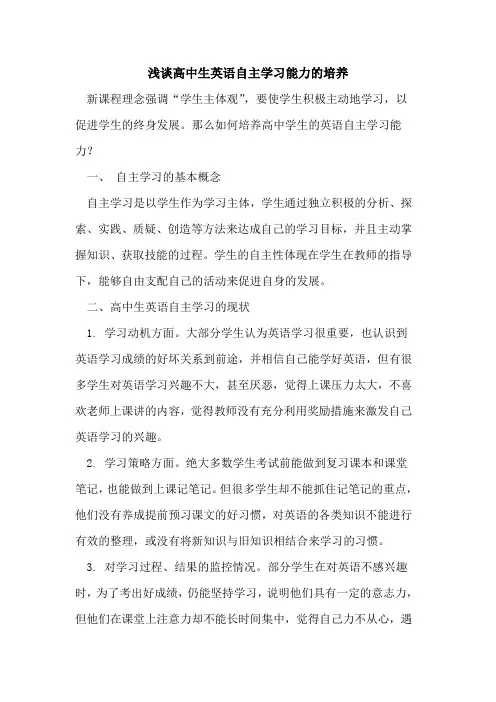
浅谈高中生英语自主学习能力的培养新课程理念强调“学生主体观”,要使学生积极主动地学习,以促进学生的终身发展。
那么如何培养高中学生的英语自主学习能力?一、自主学习的基本概念自主学习是以学生作为学习主体,学生通过独立积极的分析、探索、实践、质疑、创造等方法来达成自己的学习目标,并且主动掌握知识、获取技能的过程。
学生的自主性体现在学生在教师的指导下,能够自由支配自己的活动来促进自身的发展。
二、高中生英语自主学习的现状1. 学习动机方面。
大部分学生认为英语学习很重要,也认识到英语学习成绩的好坏关系到前途,并相信自己能学好英语,但有很多学生对英语学习兴趣不大,甚至厌恶,觉得上课压力太大,不喜欢老师上课讲的内容,觉得教师没有充分利用奖励措施来激发自己英语学习的兴趣。
2. 学习策略方面。
绝大多数学生考试前能做到复习课本和课堂笔记,也能做到上课记笔记。
但很多学生却不能抓住记笔记的重点,他们没有养成提前预习课文的好习惯,对英语的各类知识不能进行有效的整理,或没有将新知识与旧知识相结合来学习的习惯。
3. 对学习过程、结果的监控情况。
部分学生在对英语不感兴趣时,为了考出好成绩,仍能坚持学习,说明他们具有一定的意志力,但他们在课堂上注意力却不能长时间集中,觉得自己力不从心,遇到读不懂或生词较多的文章就想放弃。
大多数学生能经常评价自己学习进步的情况,反思自己的学习效果。
三、对提高高中生英语自主学习能力的改进措施1.创设合理情境,角色互换,提高课堂教学效益。
作为教师,在课堂中必须转变自己教学内容编排、问题情境创设等教学行为,让学生逐渐地融入课堂,这样的课堂才能成为高效的课堂。
师生可以角色互换,教师亲自体验学生的学。
在教学中,以学生为主,教师始终站在学生的角度,英语课堂才能真正地生动起来。
2.调动学生英语学习的积极性,进行任务型教学。
任务型教学中的任务是真实生活任务或模拟真实任务,强调让学生的注意力主要放在怎样用所学的语言去做事,在一个或多个具体的活动任务当中完成英语的教学目标,同时在完成任务的过程中提高学生运用英语的能力。
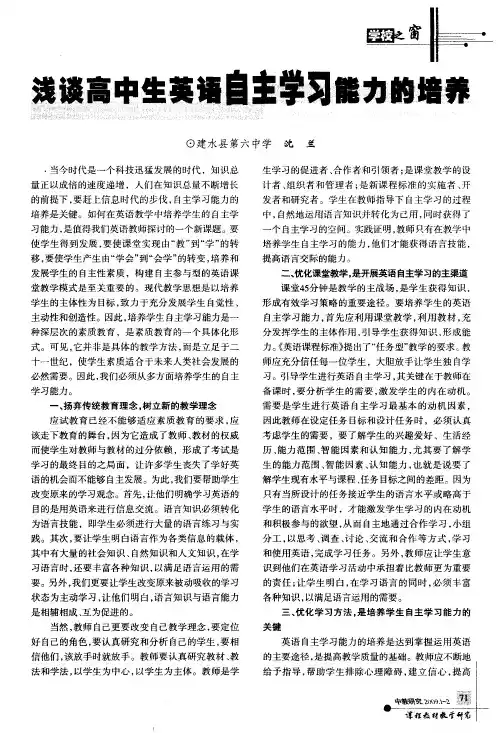
瀑j麟j毒中售摹嗨喜事学习?麓O建水县第六中学沈兰.当今时代是一个科技迅猛发展的时代,知识总量正以成倍的速度递增,人们在知识总量不断增长的前提下,要赶上信息时代的步伐,自主学习能力的培养是关键。
如何在英语教学中培养学生的自主学习能力,是值得我们英语教师探讨的一个新课题。
要使学生得到发展,要使课堂实现由“教”到“学”的转移,要使学生产生由“学会”到“会学”的转变,培养和发展学生的自主性素质,构建自主参与型的英语课堂教学模式是至关重要的。
现代教学思想是以培养学生的主体性为目标,致力于充分发展学生自觉性、主动性和创造性。
因此,培养学生自主学习能力是一种深层次的素质教育,是素质教育的一个具体化形式。
可见,它并非是具体的教学方法,而是立足于二十一世纪,使学生素质适合于未来人类社会发展的必然需要。
因此,我们必须从多方面培养学生的自主学习能力。
一、扬弃传统教育理念,树立新的教学理念应试教育已经不能够适应素质教育的要求,应该走下教育的舞台,因为它造成了教师、教材的权威而使学生对教师与教材的过分依赖,形成了考试是学习的最终目的之局面,让许多学生丧失了学好英语的机会而不能够自主发展。
为此,我们要帮助学生改变原来的学习观念。
首先,让他们明确学习英语的目的是用英语来进行信息交流。
语言知识必须转化为语言技能,即学生必须进行大量的语言练习与实践。
其次,要让学生明白语言作为各类信息的载体,其中有大量的社会知识、自然知识和人文知识,在学习语言时,还要丰富各种知识,以满足语言运用的需要。
另外,我们更要让学生改变原来被动吸收的学习状态为主动学习,让他们明白,语言知识与语言能力是相辅相成、互为促进的。
当然,教师自己更要改变自己教学理念,要定位好自己的角色,要认真研究和分析自己的学生,要相信他们,该放手时就放手。
教师要认真研究教材、教法和学法,以学生为中心,以学生为主体。
教师是学陬窗_办的培养生学习的促进者、合作者和引领者;是课堂教学的设计者、组织者和管理者;是薪课程标准的实施者、开发者和研究者。
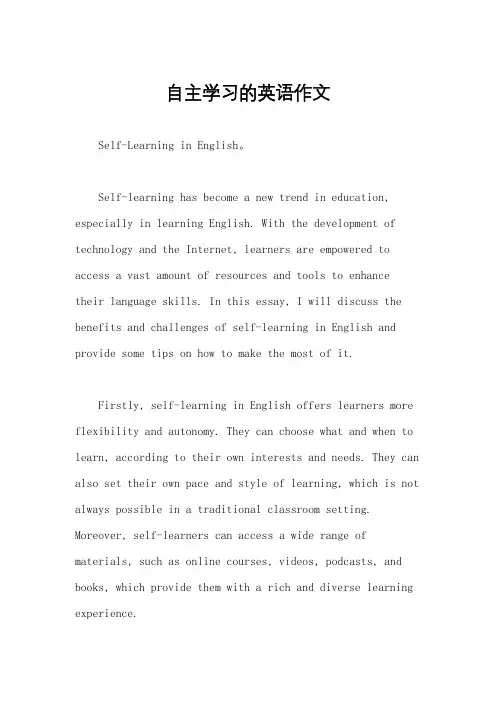
自主学习的英语作文Self-Learning in English。
Self-learning has become a new trend in education, especially in learning English. With the development of technology and the Internet, learners are empowered to access a vast amount of resources and tools to enhancetheir language skills. In this essay, I will discuss the benefits and challenges of self-learning in English and provide some tips on how to make the most of it.Firstly, self-learning in English offers learners more flexibility and autonomy. They can choose what and when to learn, according to their own interests and needs. They can also set their own pace and style of learning, which is not always possible in a traditional classroom setting. Moreover, self-learners can access a wide range of materials, such as online courses, videos, podcasts, and books, which provide them with a rich and diverse learning experience.Secondly, self-learning in English can help learners develop important skills, such as critical thinking, problem-solving, and self-discipline. They need to be able to evaluate the quality and relevance of the materials they use, and to manage their time and resources effectively. They also need to be able to monitor their progress and adjust their learning strategies accordingly. These skills are not only useful for learning English but also for personal and professional development.However, self-learning in English also poses some challenges. One of the biggest challenges is the lack of feedback and interaction. Learners may not have the opportunity to practice their speaking and writing skills, or to receive feedback from a teacher or a peer. They may also feel isolated and demotivated without the support and encouragement of others. Another challenge is the risk of information overload and distraction. Learners may find it difficult to focus on one task or topic, or to filter out irrelevant or misleading information.To overcome these challenges, self-learners can adopt some effective strategies. Firstly, they can join online communities or language exchange programs to interact with other learners and native speakers. They can also use language learning apps or platforms that provide feedback and personalized learning paths. Secondly, they can set specific goals and deadlines to motivate themselves and track their progress. They can also use time management techniques and avoid multitasking or procrastination. Lastly, they can develop a habit of reflection and self-evaluation, by asking themselves questions such as "What did I learn today?" or "What could I have done better?"In conclusion, self-learning in English has both advantages and disadvantages, but with the right mindset and strategies, learners can make the most of it and achieve their language goals. It requires self-discipline, motivation, and perseverance, but it also offers a rewarding and enriching learning experience. Therefore, I encourage everyone who wants to improve their Englishskills to explore the world of self-learning and discover their own path to success.。
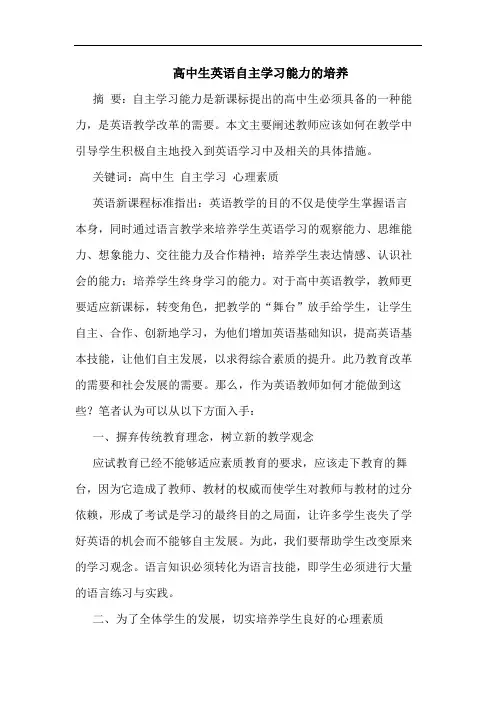
高中生英语自主学习能力的培养摘要:自主学习能力是新课标提出的高中生必须具备的一种能力,是英语教学改革的需要。
本文主要阐述教师应该如何在教学中引导学生积极自主地投入到英语学习中及相关的具体措施。
关键词:高中生自主学习心理素质英语新课程标准指出:英语教学的目的不仅是使学生掌握语言本身,同时通过语言教学来培养学生英语学习的观察能力、思维能力、想象能力、交往能力及合作精神;培养学生表达情感、认识社会的能力;培养学生终身学习的能力。
对于高中英语教学,教师更要适应新课标,转变角色,把教学的“舞台”放手给学生,让学生自主、合作、创新地学习,为他们增加英语基础知识,提高英语基本技能,让他们自主发展,以求得综合素质的提升。
此乃教育改革的需要和社会发展的需要。
那么,作为英语教师如何才能做到这些?笔者认为可以从以下方面入手:一、摒弃传统教育理念,树立新的教学观念应试教育已经不能够适应素质教育的要求,应该走下教育的舞台,因为它造成了教师、教材的权威而使学生对教师与教材的过分依赖,形成了考试是学习的最终目的之局面,让许多学生丧失了学好英语的机会而不能够自主发展。
为此,我们要帮助学生改变原来的学习观念。
语言知识必须转化为语言技能,即学生必须进行大量的语言练习与实践。
二、为了全体学生的发展,切实培养学生良好的心理素质一个缺乏信心、胆怯、意志不坚强而又缺少兴趣的人是永远做不好事情的。
对于学生,这些都是影响他们自主学习的障碍。
当然,它还要涉及学生非智力因素开发的问题。
那么,我们如何才能够帮助他们消除这些自主学习的障碍呢?1.巧设问题,给学生展示自我、体验成功的空间我们的教育是面向全体学生的,是以培养所有学生的全面健康发展和终身学习为目的的。
因此,教师在设计每一个教学计划时,一定要认真备课,要充分考虑每个学生的差异而设计不同层次的问题,以便学生进行讨论、合作、互动、交流、自主的学习活动。
同时,能够给他们提供能够展示自我、体验成功的时空。
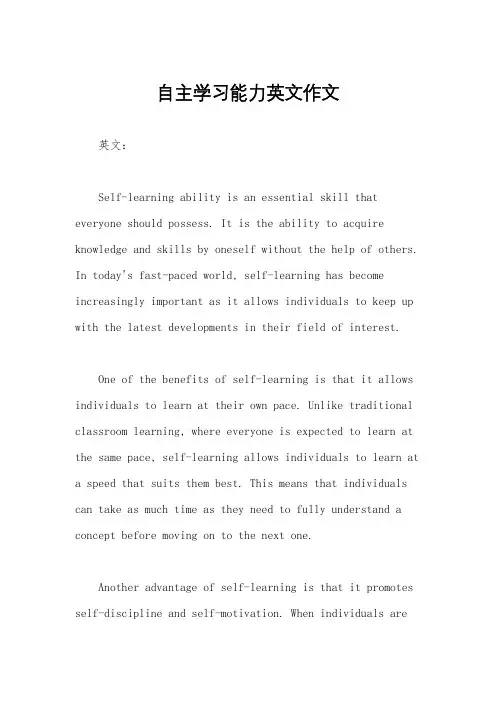
自主学习能力英文作文英文:Self-learning ability is an essential skill that everyone should possess. It is the ability to acquire knowledge and skills by oneself without the help of others. In today's fast-paced world, self-learning has become increasingly important as it allows individuals to keep up with the latest developments in their field of interest.One of the benefits of self-learning is that it allows individuals to learn at their own pace. Unlike traditional classroom learning, where everyone is expected to learn at the same pace, self-learning allows individuals to learn at a speed that suits them best. This means that individuals can take as much time as they need to fully understand a concept before moving on to the next one.Another advantage of self-learning is that it promotes self-discipline and self-motivation. When individuals areresponsible for their own learning, they are more likely to be motivated to learn and take ownership of their education. This leads to a greater sense of accomplishment and satisfaction when they achieve their learning goals.In addition, self-learning can be a cost-effective wayof acquiring knowledge and skills. With the vast array of resources available online, individuals can access a wealth of information for free or at a low cost. This means that individuals can acquire new skills without having to spenda lot of money on expensive courses or training programs.However, self-learning does require a certain level of discipline and commitment. It can be easy to get distracted or lose motivation when there is no one else to hold you accountable. Therefore, it is important to set clear goals and establish a routine to ensure that you stay on track.Overall, self-learning is a valuable skill that can benefit individuals in many ways. By taking responsibility for their own learning, individuals can learn at their own pace, develop self-discipline and motivation, and acquirenew skills in a cost-effective way.中文:自主学习能力是每个人都应该具备的重要技能。
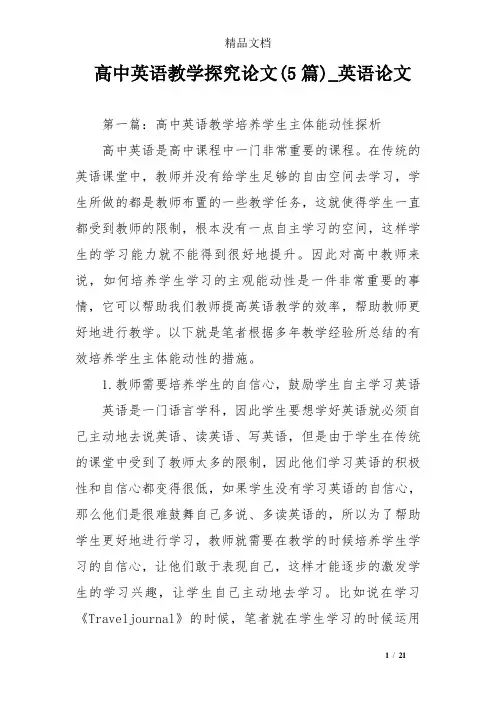
高中英语教学探究论文(5篇)_英语论文第一篇:高中英语教学培养学生主体能动性探析高中英语是高中课程中一门非常重要的课程。
在传统的英语课堂中,教师并没有给学生足够的自由空间去学习,学生所做的都是教师布置的一些教学任务,这就使得学生一直都受到教师的限制,根本没有一点自主学习的空间,这样学生的学习能力就不能得到很好地提升。
因此对高中教师来说,如何培养学生学习的主观能动性是一件非常重要的事情,它可以帮助我们教师提高英语教学的效率,帮助教师更好地进行教学。
以下就是笔者根据多年教学经验所总结的有效培养学生主体能动性的措施。
1.教师需要培养学生的自信心,鼓励学生自主学习英语英语是一门语言学科,因此学生要想学好英语就必须自己主动地去说英语、读英语、写英语,但是由于学生在传统的课堂中受到了教师太多的限制,因此他们学习英语的积极性和自信心都变得很低,如果学生没有学习英语的自信心,那么他们是很难鼓舞自己多说、多读英语的,所以为了帮助学生更好地进行学习,教师就需要在教学的时候培养学生学习的自信心,让他们敢于表现自己,这样才能逐步的激发学生的学习兴趣,让学生自己主动地去学习。
比如说在学习《Traveljournal》的时候,笔者就在学生学习的时候运用鼓舞性的语言给他们进行教学,只要学生做出了一定的努力,笔者都会对他们进行一定的肯定,让学生认识到自己的进步,这样就逐渐的培养起学生学习的自信。
例如在让学生阅读课文的时候,有些学生缺乏自信,他们不敢大声地将文章读出来,这时笔者就鼓励他们,在经过笔者的鼓励之后,学生开始初步的进行阅读尝试,而当他们读完之后,笔者就鼓励他们,告诉他们读的不错,这样学生的自信就被培养了出来。
学生的自信心被培养了出来,他们学习的兴趣也被激发出来,每一个人都开始积极地进行自主学习。
2.教师需要给学生自主学习的空间笔者觉得学生的主体能动性之所以没有得到增长,主要就是因为我们教师没有给学生自主学习的空间,在传统的课堂上,教师一直占据着课堂的主体地位,他们总是命令学生去学习,这就使得学生失去了学习的自由,而且由于长时间受到教师的限制,学生学习的积极性也被降低了,所以为了让学生更好地发挥自身的主体能动性去学习,我们教师就必须给学生自主学习的空间。
高中生英语学科自主学习能力培养策略探究摘要:教师要利用各种途径实现学生由“要我学”到“我要学”的转变。
那么,作为新课改下的教育工作者,就要不断更新教学理念,贯彻实施新课程理念;激发学生的学习兴趣;建立有效的评价体系,培养学生自主学习英语的能力。
关键词:高中生;英语学习;自主探究中图分类号:g633.41 文献标识码:a 文章编号:1006-3315(2012)05-019-001《普通高中英语课程标准(实验)》明确指出:“高中英语课程的总目标是使学生在义务教育阶段英语学习的基础上,进一步明确英语学习的目的,发展自主学习和合作学习的能力;形成有效的英语学习策略;培养学生的综合语言运用能力。
”学习策略是提高学习效率、发展自主学习能力的先决条件。
首先,教师要不断更新教学理念,逐步完善教学模式。
教师要积极主动地更新教学理念,要培养学生自主学习的能力。
传统的英语教学模式受制于应试教育,教师往往过分强调英语字、词、语法知识的传授,而忽视了学生英语自主学习能力的培养。
而学生在这种“灌输式”教学中,也养成了依赖性强和缺乏自信心等不良的学习心理问题,磨灭了他们人格发展中的自主学习精神。
目前,我们正沐浴着新课改的春风,这为我们打破传统、挑战自我提供了平台。
当然,我们也面临着严峻的考验。
要培养高中生的自主学习、自主发展能力,教师就必须不断学习新的教育理念,并在课堂中尽可能多地创设自主学习的环境。
因为教师是教育教学活动的实施者,如果教师的教育理念不更新,就不可能真正实现教学方法的转变,培养学生自主学习能力的教育目标就无法实现。
因此,作为教师,要利用各种方式和渠道,全方位地更新自己的教育理念。
确立为“学”而“教”的指导思想,不断学习,不断反思,不断创新。
其次,教师要激发学生学习兴趣,引导学生自主学习。
兴趣是推动学生学习的内驱力。
当学生对学习感兴趣时,他们就会乐意地去学习、探究并表现出高度集中的注意力和敏锐的感知力。
所以,作为教师,要尽全力去激发学生的学习兴趣,学生有了兴趣就不会感到学习是一种额外的负担,就会主动地去学。
高中生英语作文《学生自主学习与合作能力》The Importance of Self-Learning and Collaborative Skills for Students In the rapidly changing world we live in, the ability to learn independently and collaborate with others is becoming increasingly important for students.Self-learning and collaborative skills are not only crucial for academic success but also for personal and professional development.Self-learning is the ability to acquire knowledge and skills on one's own, without relying on a teacher or instructor.This is an essential skill for students as it allows them to take control of their own learning and become lifelong learners.By developing self-learning skills, students can become more independent and self-reliant, which is important as they transition from high school to college and eventually into the workforce.Collaborative skills, on the other hand, are the ability to work effectively with others to achieve a common goal.In today's society, many tasks and projects require collaboration, whether it's in the classroom, in the workplace, or in everyday life.By developing collaborative skills, students can learn to communicate effectively, listen to others' perspectives, and respect different viewpoints.Both self-learning and collaborative skills are important for students to succeed in today's world.Self-learning skills help students to become independent learners and take responsibility for their owneducation.Collaborative skills, on the other hand, help students to work effectively with others and achieve common goals.By developing these skills, students can become more successful in school, work, and life.In conclusion, self-learning and collaborative skills are essential for students to succeed in today's world.These skills not only help students to achieve academic success but also to develop personally and professionally.It is important for students to develop these skills early on and continue to practice and refine them throughout their lives.。
高中英语作文自主学习与被动学习【中英文实用版】Autonomous Learning vs.Passive LearningIn today's rapidly advancing society, the way we learn is undergoing significant changes.Two contrasting approaches to learning have emerged: autonomous learning and passive learning.While both methods have their merits, the advantages of autonomous learning far outweigh those of passive learning.Passive learning, as the name suggests, is a more traditional and teacher-centered approach.In this method, students receive information and knowledge from teachers and textbooks.They listen, take notes, and memorize the content without much interaction or engagement.This approach often leads to a lack of critical thinking and problem-solving skills.Students become dependent on teachers and struggle to learn independently.On the other hand, autonomous learning is a student-centered approach that emphasizes self-reliance and independence.Students take charge of their learning, identify their strengths and weaknesses, and set their own learning goals.They actively seek out resources, collaborate with peers, and engage in critical thinking and problem-solving.This method fosters creativity, innovation, and a lifelong love for learning.Several factors contribute to the growing importance of autonomouslearning.Firstly, the availability of technology has revolutionized the way we access information.The internet and various educational platforms provide a wealth of knowledge at our fingertips, enabling students to learn at their own pace and explore topics of interest.Secondly, the world is becoming more competitive, and employers are seeking individuals who can think critically, adapt to change, and solve complex problems.Autonomous learning prepares students for these challenges by developing their critical thinking and problem-solving stly, autonomous learning promotes self-awareness and self-motivation.Students who take responsibility for their learning develop a better understanding of their strengths and weaknesses, which helps them make informed decisions about their future paths.In conclusion, while passive learning has its place, autonomous learning is becoming increasingly crucial in preparing students for the demands of the 21st century.It fosters critical thinking, problem-solving, and self-reliance, which are essential skills for success.As educators, we must encourage and support students in taking ownership of their learning, thereby empowering them to become lifelong learners.。
自主学习英语作文200字Certainly, here's a 200-word English essay on self-learning English:---。
Self-learning English is an enriching journey that opens doors to numerous opportunities and enhances personal growth. Through self-study, individuals develop autonomy, perseverance, and critical thinking skills.Firstly, self-learning fosters autonomy by allowing learners to take control of their learning pace and style. Unlike traditional classroom settings, self-study empowers individuals to choose their materials, set goals, andtailor learning strategies according to their preferences and needs. This autonomy promotes a sense of ownership and accountability, motivating learners to stay committed to their language journey.Moreover, self-learning English cultivates perseverance as learners navigate through challenges independently. Without the immediate guidance of a teacher, learners encounter difficulties such as unfamiliar vocabulary, complex grammar structures, and pronunciation hurdles. However, overcoming these obstacles through consistent practice and resourcefulness strengthens resilience and determination.Additionally, self-study encourages critical thinking as learners engage with diverse learning resources. By exploring a variety of materials such as articles, videos, podcasts, and interactive apps, learners develop analytical skills and the ability to evaluate information critically. This analytical prowess extends beyond language learning, benefitting learners in various aspects of their lives.In conclusion, self-learning English is a rewarding endeavor that promotes autonomy, perseverance, and critical thinking. By embracing self-study, individuals embark on a transformative journey towards linguistic proficiency and personal development.--。
《提高自主学习能力的方法》高中生英语作文Improving Self-Learning Abilities: Methods and StrategiesIn the era of rapid development and information explosion, the ability of self-learning has become increasingly important.It is not only a crucial skill for academic success but also a vital quality for personal growth and career development.As high school students, we should strive to cultivate and enhance our self-learning abilities.In this essay, I will discuss several methods and strategies that can help us improve our self-learning skills.Firstly, setting clear goals is essential for effective self-learning.Before starting any learning task, we should define our objectives and outline the desired outcomes.This will help us stay focused and motivated throughout the learning process.Additionally, breaking down complex tasks into smaller, manageable steps can make the learning process less daunting and more achievable.Secondly, developing a structured learning plan is crucial.We should allocate specific time slots for different subjects and tasks, ensuring a balanced distribution of our efforts.Creating a daily or weekly schedule will help us stay organized and make the most of our time.Moreover, regularly reviewing and assessing our progress will enable us to adjust our learning strategies and make necessary improvements.Thirdly, active engagement in the learning process is key toenhancing self-learning abilities.Instead of passively absorbing information, we should actively seek out knowledge and resources.This can be done through reading books, attending lectures, participating in discussions, and utilizing online platforms.Actively questioning and challenging concepts will help deepen our understanding and foster critical thinking skills.Fourthly, developing good study habits is vital for self-learning.This includes effective note-taking, proper time management, and avoiding procrastination.Regular exercise and sufficient rest are also important for maintaining a healthy and alert mind.Additionally, cultivating a growth mindset and embracing challenges will help us persevere through difficulties and continuously improve.Lastly, seeking feedback and constructive criticism is crucial for self-improvement.We should actively seek input from teachers, peers, and mentors, and be open to suggestions for improvement.Reflecting on our own learning processes and identifying areas for improvement will help us grow and develop.In conclusion, improving self-learning abilities is an ongoing process that requires effort and persistence.By setting clear goals, developing a structured plan, actively engaging in learning, developing good study habits, and seeking feedback, we can enhance our self-learning skills and become more independent and effective learners.With these methodsand strategies, we can better prepare ourselves for future challenges and opportunities.。
XXXX大学本科毕业论文(设计)任务书编号:论文(设计)题目:论高中生英语自主学习能力的培养学院:XXXX学院专业:英语教育班级:XXXX级英语教育1班学生姓名:XXXX学号:XXXX指导教师:XXXX职称:教授1、论文(设计)研究目标及主要任务本论文的研究目标是探讨自主学习的重要作用及如何培养中学英语教学。
其主要任务是指导中学学生的英语自主学习能力的培养。
2、论文(设计)的主要内容本论文分为三章,第一章自主学习能力的定义、理论依据以及重要性,第二章介绍学生在自主学习能力培养中的作用,第三章阐述教师对自主学习能力的养成的辅助作用,最后一章说明家庭因素在学生自主学习能力的培养中的作用。
3、论文(设计)的基础条件及研究路线本论文的基础条件是中外语言学家及教育学家对自主学习的研究和讨论。
研究路线是通过对自主学习的理论研究,从学生、教师和家长三个方面探讨培养学生英语自主学习能力的方法。
4、主要参考文献Dam, L. (1995) Autonomy from Theory to Classroom Practice. Dublin: Authentik. Krashen,S.D. (1982). Principles and Practice in Second Language Acquisition[M]. New York:Pergamon Press Ltd..Piaget, J. (1985). The equilibration of cognitive structure: the central problem of intellectual development. Chicago: The University of Chicago Press.刘景福:PBL:自主学习的新模式,《宁波大学学报》(教育科学版),2007(10)。
教师:年月日教研室主任:年月日注:一式三份,学院(系)、指导教师、学生各一份XXXX大学本科生毕业论文(设计)开题报告书 XXXX 学院英语教育专业XXXX届XXX大学本科生毕业论文(设计)评议书XXX大学本科生毕业论文(设计)文献综述Literature ReviewLearner Autonomy has come into vogue in foreign language education in the past years, especially after the raise of lifetime learning idea. Language teaching is now treated as language learning and it has put the learner as the core of our attention in language learning education.The term “learning autonomy” was first put forward in 1980s by Henri Holec who is considered the “father” of learner autonomy. The term has many definitions. It has been considered as a personal characteristic, as a political concept, or as an educational practice. This is because autonomy is regarded either or both as a method or as a final goal in education.There are many famous definitions in present literature. Holec (1981) defined autonomy as “the ability to take charge of one‟s own learning”. By David Little (1991), “autonomy is essentially a matter of the learner's psychological relation to the process and content of learning”. Leslie Dick inson has put forward that learning autonomy is a situation in which the learner is completely reposeful for the choices concerned with his or her learning and the effect of those choices. Phil Benson view learning autonomy as “a recognition of the rights of learners within educational systems”.Learning autonomy is based on Constructivism theory. It is a theory to explain how knowledge is constructed in the humankind when information brings into contact with knowledge in existence that had been developed by experiences. It has its origins in cognitive psychology and biology and an approach to education that put emphasis on the ways knowledge is created in order to fit in the world. Constructs are different types of filters we choose to put over our realities to change our reality from confusion to order.Constructivist learning theory is a philosophy thought prevailed in 1960s and 1970s. It was first proposed by Swiss psychologist Piaget. According to the theory, students‟ knowledge is not gained through teachers‟ lecture but gained through active and constructing way with the help of others, by using necessary learning material incertain circumstance, that is, socio-cultural background. The core of constructivism is: regarding students as the center of learning, emphasizing students searching knowledge actively. Constructivism stands that the type of learner is self-directed, creative, and innovative. The objective in education is to become creative and innovative through analysis, conceptualizations, and synthesis of previous experience to create new knowledge. The learning goal is the highest order of learning: heuristic problem solving, meta-cognitive knowledge, creativity, and originality.Discovery learning is a technique of inquiry-based instruction and is considered a constructivist based approach to education. It is supported by the work of learning theorists and psychologists Jean Piaget, Jerome Bruner, and Seymour Papert. Although this form of instruction has great popularity, there is some debate in the literature concerning its efficacy (Mayer, 2004).Jerome Bruner is often credited with originating discovery learning in the 1960s, but his ideas are very similar to those of earlier writers (e.g. John Dewey). Bruner argues that “Practice in discov ering for oneself teaches one to acquire information in a way that makes that information more readily viable in problem solving” (Bruner, 1961, p. 26). This philosophy later became the discovery learning movement of the 1960s. The mantra of this philosophical movement suggests that we should learn by doing. In 1991, The Grauer School, a private secondary school in Encinitas, California, was founded with the motto, “Learn by Discovery”, and integrated a series of world-wide expeditions into their program for high school graduation.Instructional scaffolding is a learning process designed to improve a deeper level of learning.Instructional scaffolding is the obligation of sufficient support to promote learning when concepts and skills are being first introduced to students. These supports may include the following: resources, a compelling task, templates and guides, guidance on the development of cognitive and social skills.Self-regulated learning theory attempt to explain why and how students learn on their own and what students should know about themselves and study tasks in order to learn independently. It focuses on how students manage their own learning. It本科生毕业论文设计题目:论高中生英语自主学习能力的培养作者姓名: XX指导教师: XX所在学院: XX学院专业(系):英语教育班级(届): XX届完成日期 2013 年 5 月 8 日On Cultivating High School Students` Autonomy in EnglishLearningBYXXProf. XXX, TutorA Thesis Submitted to Department of EnglishLanguage and Literature in PartialFulfillment of theRequirements for the Degree of B.A. in EnglishAt XXXXUniversityMay 8th, 2013AbstractWith the development of the society, the information changes faster and faster. The contact between China and other foreign countries in political, economy and culture becomes closer. Therefore, learning English, an international language, becomes more important. In English teaching, teachers should focus on training students to use English to express thoughts and solve problems. Although the reform in our country‟s English teaching has been carrying on, there still exist many problems in Chinese English teaching. To solve these problems, the cultivation of students' autonomous learning ability is an effective method. This paper focuses on the role of students, teachers and parents in the fostering of students‟ autonomous learning ability. Students, who are the main body of independent study, should be put at the central position. The importance of teachers‟ assisted effect can not be neglected. Chinese famous educator Tao Xingzhi once said: "a good teacher is not to teach textbook, not to teach the students, but to teach students to learn." At last, the thesis introduces the parents‟ role in the process of cultivating students‟autonomous learning. To achieve the goal of training students‟active autonomous learning ability needs the cooperation of different people.Key words:autonomous learning, learning strategies, high school English learning摘要随着时代的发展,信息的传播速度越来越快。